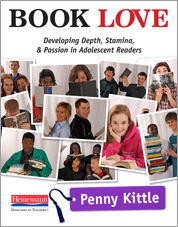Promote a Passion for Reading
Book Love: Developing Depth, Stamina and Passion in Adolescent Readers
by Penny Kittle
(Heinemann, 2012 – Learn more)
Penny Kittle’s descriptions of the readers in her classrooms, the ones who expertly pretend to read and then develop evasive strategies to fool the teacher into thinking they have been reading, were so spot-on in Book Love that I felt she may have been eavesdropping in my own sixth grade classroom.
Surely, I thought, she knows my collection of students who don’t seem to find joy in reading and therefore don’t read. That’s when I realized that Kittle is exploring a theme unfortunately common across so many of our classrooms. With that sense of shared purpose, I eagerly dove into her book to try to ferret out some solutions.
Penny Kittle delivers, on many levels. Book Love is a both an ode to the power of reading to expand our interests and intellect, and a guide to encouraging even the most reluctant readers in our classrooms to read and enjoy more books.
Woefully underprepared readers

Second, students don’t have enough choice in what they do read, or enough guidance to find the books and texts that will engage them as readers. For some, it’s just that they have not had the right book fall into their hands at the right moment in time.
Finally, Kittle maintains that too many students don’t self-identify themselves as readers, and this lack of identity feeds into the negative loop of students not seeing reading as something valuable for life, not just something required at school.
The voices of students
Book Love brings us into Kittle’s classrooms (she is a literacy coach and a classroom teacher, too) and we get to see her work directly with kids, even the ones who honestly claim to have read only sporadically and sparingly over the years. It’s interesting to note that her conversations with mentor Donald Graves (a legend in the writing workshop world) led her to videotape interviews with her students, who open up with honesty about their reading habits and interests, or lack thereof.
Those interviews, and her own observations, help formulate Kittle’s suggestions for reaching all readers and encouraging stamina in reading and love of books. Her tips on how to have classroom book talks to spark interest, how to stage short one-on-one book conferences guided by inquiry questions, how to find personal fluency levels, and ways to set realistic goals for students are all valuable for any level. She also makes it clear that classrooms must have engaging libraries of books, readily available for students. The classroom has to be immersed in literacy and love of books.
Creating reader-friendly schools and classrooms
Kittle contends that a school community and a classroom environment can be established in ways that instill the love of reading. To create this effect, teachers and school leaders should:
• Provide access for students to a wide range of books that appeal to a wide range of readers. This should happen through a combination of libraries, classrooms and home environments.
• Be flexible with our view of texts and have a plan for dealing with students who don’t want to read books but will read other kinds of texts (newspapers, magazines, manuals, etc.). That said, Kittle frowns on any kind of electronics during quiet reading due to the distraction factor.
• Maintain silence during sustained reading time, and value that reading time in the classroom. Kittle wonders why so many teachers make silent reading a homework activity instead of providing time in the classroom. She notes that when reading becomes homework the reluctant readers are more apt to turn to SparkNotes and other summary sites rather than read the assigned book.
• Establish clear and consistent expectations from student readers. Much of Kittle’s book lays out how she and her students do this: keeping track of pages read over a semester; establishing a “next read” book list; writing self-reflections about what it means to be a reader as part of a final project.
• Recommend books to students. Kittle suggests we do this with more deliberate thought and with high frequency, over a range of genres and authors. While it is better for teachers to have read books that you are recommend, Kittle notes that you could also be sharing books you want to read, and explaining why. The idea is to set a spark in a student’s mind about particular books.
• Deal directly with the non-readers by having teachers “… invite kids into reading, not force them into it. We want suggestions and encouragement and a commitment to helping students find a good-fit book. This is job one: modeling enjoyment, passion and the value of reading (145).” Don’t blame a disinterest in reading on past teachers, the world of technology or the home environment. Don’t give up on students as readers. As Kittle shows in vignettes throughout the book, when the reading bug catches, it can be transformative in the lives of young people.
The Book Love Foundation
To her credit, Penny Kittle has put her money where her mouth is, so to speak. In concert with this book, Kittle and her husband (with support from Heinemann) have established The Book Love Foundation for creating libraries of books that can be donated to classrooms that lack funding and external support. (For more information about The Book Love Foundation, visit http://booklovefoundation.org/ ) Her intention is to donate libraries to classrooms every single year.
I’ll leave you with a final quote from Kittle:
“I believe every child in America needs access to books that will keep him or her turning pages, racing to the end, discovering new ideas, and learning to understand the diversity in our world. I believe all children deserve books they can and will want to read and teachers who will guide them to improve as readers. (169).”
Amen to that.
Kevin Hodgson is a sixth grade teacher in Southampton, Massachusetts, and is the technology liaison with the Western Massachusetts Writing Project. Kevin blogs regularly at Kevin’s Meandering Mind and tweets more often than is healthy under his @dogtrax handle.
































Thanks for this review, Kevin. My only correction is I am still a classroom teacher. I have two high school classes this year and spend the rest of my full-time teaching job as a literacy coach K-12.
I only note this because staying in teaching is important to me. I own the literacy development of students every year–it’s all on me. I know the daily challenges of engaging adolescent readers–this week.
Looking forward to meeting you some time.
:) Penny
I read & loved Book Love over Christmas vacation. I also just finished Charlie Joe Jackson’s Guide to Not Reading by Tommy Greenwald. These two books go together so well, present opposite sides of the same coin. Charlie Joe, like many of my students, has learned to play the game of not reading. Like Penny, I keep working to entice them to join the literacy club and see the power of books and reading to transform my students every day.